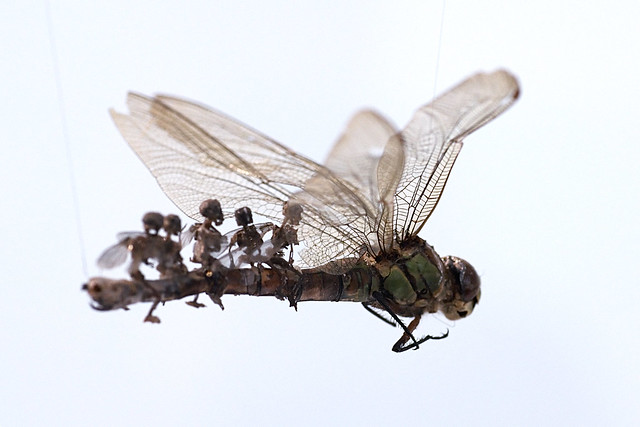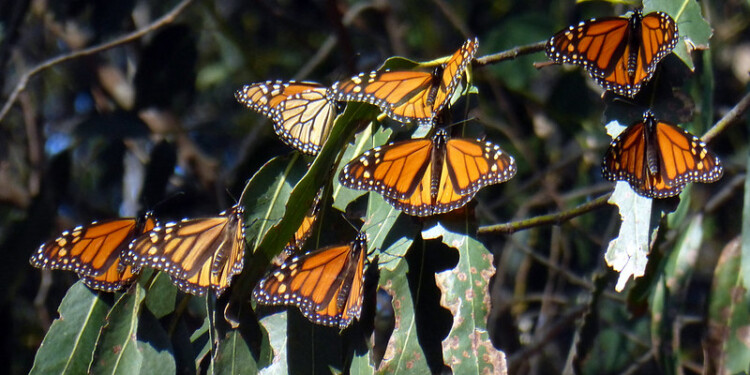In a new study published last Wednesday in Nature, researchers reveal that areas most affected by the interaction of rising temperatures and industrial farming register a 49 percent drop in insect abundance compared to more pristine habitats.
Besides the drastic decrease in population numbers, scientists have also recorded a 27 percent drop in the diversity of species.
Back in 2019, Impakter had already addressed the issue of insects’ disappearance as a major factor in the Earth’s sixth mass extinction (which designates a slice of geological time during which a large portion of biodiversity suddenly dies out). As new research confirms that a catastrophic scenario is currently unfolding, it is imperative that action is taken, and human societies’ relationships with wildlife radically reshaped.
Lead author Dr Charlie Outhwaite, a macroecologist at University College London’s Centre for Biodiversity and Environmental Research, says: “Many insects appear to be very vulnerable to human pressures, which is concerning as climate change worsens and agricultural areas continue to expand. Our findings highlight the urgency of actions to preserve natural habitats, slow the expansion of high-intensity agriculture, and cut emissions to mitigate climate change.”
The study distinguishes itself from previous research by becoming the first to identify specific interactions between climate change and industrial farming, linking them to widespread losses in insect abundance and biodiversity.
“We often only consider one driver of change, such as land use, whereas in reality a lot of drivers will be impacting the same space,” Dr Outhwaite explained.
It is also remarkably large-scale, covering 18,000 insect species and drawing from 750,000 data records collected between 1992 and 2012 at 6,000 locations across the world.
“Previous studies have been carried out at the small scale on a limited number of species or species groups,” Dr Outhwaite said.
She adds that the study’s findings “may only represent the tip of the iceberg” since many of the locations used as references for assessing change in insect populations, which count amongst the most pristine environments on the planet, would have already been disturbed by human activity at the time the study started.
Related articles: Climate Change Impacts Insects | Pressing Questions About Ecosystem Restoration, Answered | Big Investors Break Their Pledge to Fight Climate Change
Moreover, the study did not account for the effects of other negative factors such as pollution.
It clearly states, however, that industrial farming exacerbates the effects of global warming by resorting to mass deforestation as it converts large portions of land into monocrops. Deforestation does not only deprive insects of their habitats but creates significant rises in local temperatures due to the removal of vegetation that provides shade and retains moisture in the air and soil. Industrial farming leaves insects even more vulnerable to the increasingly frequent heatwaves caused by climate change.
Hence, it’s no surprise that tropical areas, which count amongst the richest and most complex ecosystems on the planet, are most severely impacted by declines in insect populations and biodiversity. This is due to the combined effects of rapid and continuous cropland expansion in tropical forests, but also to the fact that tropical animals and plants have simply not evolved to adapt to extreme temperature changes.
The sudden decline in insect population and diversity has dire consequences in terms of food production and species survival
Dr Outhwaite explains: “Losing insect populations could be harmful not only to the natural environment, where insects often play key roles in local ecosystems, but it could also harm human health and food security, particularly with losses of pollinators.”
As more than three-quarters of globally important food crops, such as cocoa, coffee, nuts, and fruits grown in the tropics, depend on animal pollination, the loss of pollinating insects could pose a great threat to food security worldwide.
Insects’ role in maintaining balanced ecosystems is vital. Many insect species including spiders, wasps, ladybugs, and praying mantis help curb the population numbers of pest insects such as fleas, aphids, and caterpillars. Insects are also key in decomposing waste and nutrient cycling, which further ensures soil fertility.
Finally, insect decline poses a serious threat to the many species that feed on them, which comprise birds, fish, bats, moles, hedgehogs, anteaters, lizards, and amphibians. Previous research has already established a connection between the 80 percent decrease in flying insects across Europe and the 400 million drop in bird populations in the past three decades.
This timely study works as a reminder that all lives, including those of human beings, are caught in intricate networks of interspecies connections and exchanges on which their survival depends. To sever a single one of these connections risks compromising the viability of the entire system.
Tom Oliver, a professor of applied ecology at the University of Reading, says “We know that you can’t just keep losing species without, ultimately, causing a catastrophic outcome. … You cannot keep removing rivets from an aeroplane without it eventually falling out of the sky.”

The way forward: Damage-containment and ecological restoration strategies
Fortunately, this new study does not stop at assessing the damage. Scientists at the UCL’s Centre for Biodiversity and Environmental Research point to strategies that could prevent the situation from getting worse and restore the abundance and biodiversity of insect populations around farmlands.
A key step would be to restrain the expansion of industrial farming and turn to low-intensity, more sustainable agriculture. “This can mean planting different crops close together, using biocontrol agents instead of pesticides to control pests, planting hedgerows or agroforestry,” said Tim Newbold, co-author of the study. In areas where such low-intensity agriculture was practised, and where 75 percent of the natural habitat was preserved, scientists found out insect populations only decreased by 7 percent, compared to a 63 percent drop in similar areas where the density of surrounding natural habitat drops below 25 percent.
“Careful management of agricultural areas, such as preserving natural habitat near farmland, may help ensure that vital insects can still thrive,” said Dr Tim Newbold.
Jane Hill, professor of Ecology at the University of York, also stated: “I think this gives us hope that we can successfully design landscapes to produce food where biodiversity can thrive.”
As the effects of climate change intensify and industrial farming continues to encroach upon key ecosystems across the globe, these strategies toward more sustainable agriculture need to be implemented urgently.
It’s also crucial that consumers remember they can play an important part in bringing forth positive environmental and social change by purchasing products, including food, that were sustainably produced.
Editor’s Note: The opinions expressed here by Impakter.com columnists are their own, not those of Impakter.com — In the Featured Photo: Some of the thousands of Monarch butterflies that overwinter at the Pismo State Beach Monarch Grove, Pismo Beach California. Featured Photo Credit: Bruce Fingerhood/Flickr










